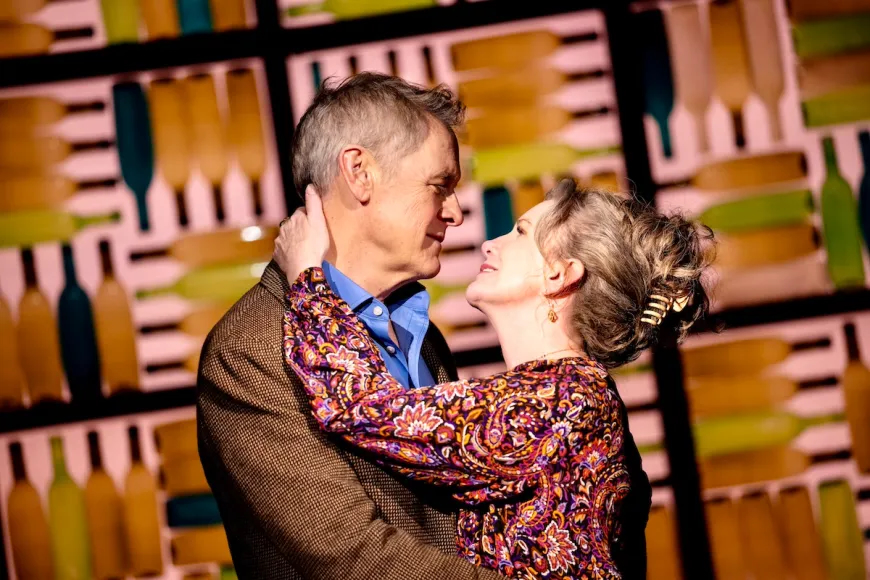STILL
by Lia Romeo
Directed by Adrienne Campbell-Holt
Starring Melissa Gilbert and Mark Moses
Loreto Theatre at the Sheen Center
Official Website
Reviewed by David Spencer
I tend to avoid spoilers, even when reviewing a play that doesn’t depend upon “suspense,” per se, Still being one of those; but there’s no way to discuss it in any meaningful way without putting its big reveal front-and-center; but it seems to be a selling point on the play’s website anyway, for reasons that will be obvious; so with that acknowledged, here goes:
A two-hander in two scenes, by Lia Romeo, it’s about the reunion of sweethearts who never crossed over into long-term commitment when they had the chance, three decades ago. They’re together anew because when he learned she’d be in town on a book tour, he reached out. They’re both near 70, but new-millennium style: their near-70 is “not that old” anymore. Mark (Mark Moses) is a prominent lawyer, Helen (Melissa Gilbert) a bestselling author. The play opens with a long scene of them getting reacquainted in a hotel bar; banter, backstory and renewal of the attraction. The second scene is in the bedroom of his room upstairs, after they’ve made love; looking ahead to whether the relationship has a future. When he mentions his intention to run for Congress.
And that’s the whoops. It comes out, unsurprisingly, that she’s a liberal Democrat; he’s a conservative Republican.
Which provides (or contrives) grist for the topic of who they really are, beyond romanticism and idealized memory; to what they believe at the core, about the state of the country, the world, their place in it.
The play asks first if there can be civilized discourse between people of two such polarized factions of contemporary society (i.e. can we reclaim at least the illusion of a bygone era’s civility, or anyway its precarious balance); and second, if people of such polarized beliefs can live with each other (in this case literally). There are other personal revelations too—which may or may not be meant to symbolize the difference between the kinds of things a society in conflict can tolerate (scene one, imperfections) and those it can’t (scene two, fundamentals).
This remount of Still is the return engagement of an off-Broadway production I didn’t see last season, with a new cast (previously Tim Daly and Jayne Atkinson). It wouldn’t be back if it hadn’t made a sufficient-enough impression, one way or the other; and Ms. Gilbert and Mr. Moses are veteran pros who can handle this mix of light-comedy/serious-overtones easily. And because of the play’s approach and theme, it will strike different people differently. My companion of the evening thought it was pandering garbage; people around me were deeply into it. The audience in general seemed at least friendly to it. I fall kind of in the middle.
For me, Still’s aspirations are noble, but the execution is mild. To wit: As a humanist liberal, Helen believes in…well, those things humanist liberals (like me) believe in. As a conservative, Mark believes policy on certain issues should be left up to the individual states—different communities, he asserts, have different needs, standards, attitudes.
And as many holes as you can poke in his position, it’s classic, right-wing, “small-government” boilerplate. He’ll absolutely cater to its constituency—and its leadership, when he needs to, to get things done—but swears he hasn’t drunk of the Kool-Aid.
Though he admits the Kool-Aiders are Out There. And he doesn’t seem inclined to alienate them.
Which, from my perspective, makes him—in a dramaturgical sense—a paper tiger. If your position begins with moral compromise, there’s no reclamation of morality later. There’s no greater good achieved, only rationalization that there’s a greater good being served. He’s weaker than she is. Period, end of (our critical) discussion.
But maybe that’s part of an intended irony, for we’ve learned in the first scene that though Helen’s a breast cancer survivor, her breasts are gone and the disease has returned. Is that symbolic? Are we to come away with the thematic subtext that Democracy is righteous but dying, while Right Wing dominance is a surviving failure? Or or or…is Still really only meant to be a small, intimate play about two people—with whom we’re meant to identify—whose fates are inextricably bound up with forces bigger than their desires—and not read into it more deeply? Either way, Ms Romeo, the playwright, gives the exchange between Mark and Helen enough equal-time weight to suggest that rapprochement between the opposing views is possible. Potential. Somehow. Maybe. If only…
Direction by Adrienne Campbell-Holt keeps things moving apace and is mostly unobtrusive, which all one can expect and is as it should be. (But for goodness’ sake someone should spot that the bed’s headboard light, house left, is shining directly into the audience’s sightline, and needs to be lowered, since it has nothing to do with set lighting or stage business. I’m guessing that the angle is an artifact from the previous iteration at the DR2 theatre, where the seats are raked upward and this distracting spot of glare would not have been an issue. The Loreto/Sheen, where Still resides now, is basically a repurposed school-type auditorium.)
Still is utterly watchable, and if it’s to your taste, at least passably entertaining, because the characters are very decently defined, the dialogue is smooth and given those tools, the actors can, as I said, navigate expertly. But in the end, if it’s not exactly bland, it’s also not nearly as provocative as its characters are provoked.
